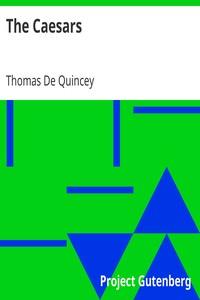Read this ebook for free! No credit card needed, absolutely nothing to pay.
Words: 63330 in 5 pages
This is an ebook sharing website. You can read the uploaded ebooks for free here. No credit cards needed, nothing to pay. If you want to own a digital copy of the ebook, or want to read offline with your favorite ebook-reader, then you can choose to buy and download the ebook.
THE CAESARS.
THE CAESARS.
Vast, therefore, unexampled, immeasurable, was the basis of natural power upon which the Roman throne reposed. The military force which put Rome in possession of this inordinate power, was certainly in some respects artificial; but the power itself was natural, and not subject to the ebbs and flows which attend the commercial empires of our days, The depression, the reverses, of Rome, were confined to one shape--famine; a terrific shape, doubtless, but one which levies its penalty of suffering, not by elaborate processes that do not exhaust their total cycle in less than long periods of years. Fortunately for those who survive, no arrears of misery are allowed by this scourge of ancient days; the total penalty is paid down at once. As respected the hand of man, Rome slept for ages in absolute security. She could suffer only by the wrath of Providence; and, so long as she continued to be Rome, for many a generation she only of all the monarchies has feared no mortal hand
--"God and his Son except, Created thing nought valued she nor shunned."
Public vengeance was now awakened; the imperial troops were marching from every quarter upon the same centre; and the slave became sensible that in a very short space of time he must be surrounded and destroyed. In this desperate situation he took a desperate resolution: he assembled his troops, laid before them his plan, concerted the various steps for carrying it into effect, and then dismissed them as independent wanderers. So ends the first chapter of the tale.
The next opens in the passes of the Alps, whither by various routes, of seven or eight hundred miles in extent, these men had threaded their way in manifold disguises through the very midst of the emperor's camps. According to this man's gigantic enterprise, in which the means were as audacious as the purpose, the conspirators were to rendezvous, and first to recognise each other at the gates of Rome. From the Danube to the Tiber did this band of robbers severally pursue their perilous routes through all the difficulties of the road and the jealousies of the military stations, sustained by the mere thirst of vengeance--vengeance against that mighty foe whom they knew only by his proclamations against themselves. Every thing continued to prosper; the conspirators met under the walls of Rome; the final details were arranged; and those also would have prospered but for a trifling accident. The season was one of general carnival at Rome; and, by the help of those disguises which the license of this festal time allowed, the murderers were to have penetrated as maskers to the emperor's retirement, when a casual word or two awoke the suspicions of a sentinel. One of the conspirators was arrested; under the terror and uncertainty of the moment, he made much ampler discoveries than were expected of him; the other accomplices were secured: and Commodus was delivered from the uplifted daggers of those who had sought him by months of patient wanderings, pursued through all the depths of the Illyrian forests, and the difficulties of the Alpine passes. It is not easy to find words commensurate to the energetic hardihood of a slave--who, by way of answer and reprisal to an edict which consigned him to persecution and death, determines to cross Europe in quest of its author, though no less a person than the master of the world--to seek him out in the inner recesses of his capital city and his private palace--and there to lodge a dagger in his heart, as the adequate reply to the imperial sentence of proscription against himself.
Such, amidst his superhuman grandeur and consecrated powers of the Roman emperor's office, were the extraordinary perils which menaced the individual, and the peculiar frailties of his condition. Nor is it possible that these circumstances of violent opposition can be better illustrated than in this tale of Herodian. Whilst the emperor's mighty arms were stretched out to arrest some potentate in the heart of Asia, a poor slave is silently and stealthily creeping round the base of the Alps, with the purpose of winning his way as a murderer to the imperial bedchamber; Caesar is watching some mighty rebel of the Orient, at a distance of two thousand leagues, and he overlooks the dagger which is at his own heart. In short, all the heights and the depths which belong to man as aspirers, all the contrasts of glory and meanness, the extremities of what is his highest and lowest in human possibility,--all met in the situation of the Roman Caesars, and have combined to make them the most interesting studies which history has furnished.
"Nec licuit populis parvum te, Nile, videre."
That he placed some confidence in dreams, for instance, is certain: because, had he slighted them unreservedly, he would not have dwelt upon them afterwards, or have troubled himself to recall their circumstances. Here we trace his human weakness. Yet again we are reminded that it was the weakness of Caesar; for the dreams were noble in their imagery, and Caesarean in their tone of moral feeling. Thus, for example, the night before he was assassinated, he dreamt at intervals that he was soaring above the clouds on wings, and that he placed his hand within the right hand of Jove. It would seem that perhaps some obscure and half-formed image floated in his mind, of the eagle, as the king of birds; secondly, as the tutelary emblem under which his conquering legions had so often obeyed his voice; and, thirdly, as the bird of Jove. To this triple relation of the bird his dream covertly appears to point. And a singular coincidence appears between this dream and a little anecdote brought down to us, as having actually occurred in Rome about twenty-four hours before his death. A little bird, which by some is represented as a very small kind of sparrow, but which, both to the Greeks and the Romans, was known by a name implying a regal station , was observed to direct its flight towards the senate-house, consecrated by Pompey, whilst a crowd of other birds were seen to hang upon its flight in close pursuit. What might be the object of the chase, whether the little king himself, or a sprig of laurel which he bore in his mouth, could not be determined. The whole train, pursuers and pursued, continued their flight towards Pompey's hall. Flight and pursuit were there alike arrested; the little king was overtaken by his enemies, who fell upon him as so many conspirators, and tore him limb from limb.
In these moments, and with this spectacle before him, and contemplating these immeasurable consequences consciously for the last time that could allow him a retreat,--impressed also by the solemnity and deep tranquillity of the silent dawn, whilst the exhaustion of his night wanderings predisposed him to nervous irritation,--Caesar, we may be sure, was profoundly agitated. The whole elements of the scene were almost scenically disposed; the law of antagonism having perhaps never been employed with so much effect: the little quiet brook presenting a direct, antithesis to its grand political character; and the innocent dawn, with its pure, untroubled repose, contrasting potently, to a man of any intellectual sensibility, with the long chaos of bloodshed, darkness, and anarchy, which was to take its rise from the apparently trifling acts of this one morning. So prepared, we need not much wonder at what followed. Caesar was yet lingering on the hither bank, when suddenly, at a point not far distant from himself, an apparition was descried in a sitting posture, and holding in its hand what seemed a flute. This phantom was of unusual size, and of beauty more than human, so far as its lineaments could be traced in the early dawn. What is singular, however, in the story, on any hypothesis which would explain it out of Caesar's individual condition, is, that others saw it as well as he; both pastoral laborers, and some of the sentinels stationed at the passage of the river. These men fancied even that a strain of music issued from this aerial flute. And some, both of the shepherds and the Roman soldiers, who were bolder than the rest, advanced towards the figure. Amongst this party, it happened that there were a few Roman trumpeters. From one of these, the phantom, rising as they advanced nearer, suddenly caught a trumpet, and blowing through it a blast of superhuman strength, plunged into the Rubicon, passed to the other bank, and disappeared in the dusky twilight of the dawn. Upon which Caesar exclaimed:--"It is finished--the die is cast--let us follow whither the guiding portents from Heaven, and the malice of our enemy, alike summon us to go." So saying, he crossed the river with impetuosity; and, in a sudden rapture of passionate and vindictive ambition, placed himself and his retinue upon the Italian soil; and, as if by inspiration from Heaven, in one moment involved himself and his followers in treason, raised the standard of revolt, put his foot upon the neck of the invincible republic which had humbled all the kings of the earth, and founded an empire which was to last for a thousand and half a thousand years. In what manner this spectral appearance was managed--whether Caesar were its author, or its dupe--will remain unknown for ever. But undoubtedly this was the first time that the advanced guard of a victorious army was headed by an apparition; and we may conjecture that it will be the last.
Great as Caesar was by the benefit of his original nature, there can--be no doubt that he, like others, owed something to circumstances; and perhaps, amongst these which were most favorable to the premature development of great self-dependence, we must reckon the early death of his father. It is, or it is not, according to the nature of men, an advantage to be orphaned at an early age. Perhaps utter orphanage is rarely or never such: but to lose a father betimes profits a strong mind greatly. To Caesar it was a prodigious benefit that he lost his father when not much more than fifteen. Perhaps it was an advantage also to his father that he died thus early. Had he stayed a year longer, he would have seen himself despised, baffled, and made ridiculous. For where, let us ask, in any age, was the father capable of adequately sustaining that relation to the unique Caius Julius--to him, in the appropriate language of Shakspeare,
"The foremost man of all this world?"
Free books android app tbrJar TBR JAR Read Free books online gutenberg
More posts by @FreeBooks










